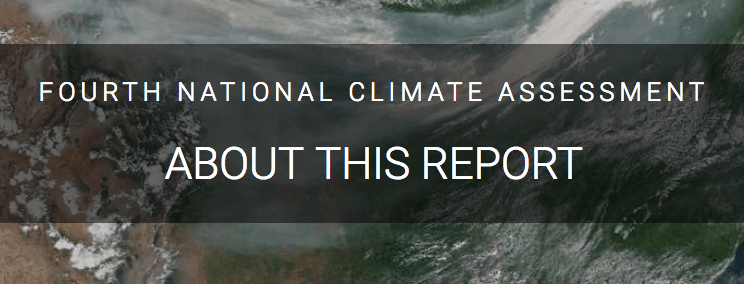

A severe and telling report dropped on Black Friday amidst post-thanksgiving turkey comas and shopping frenzies. It was evidently the hope of the Trump administration that the report would go largely underreported given the timing of the holidays, but it’s impossible to downplay the stark realities presented in the Fourth National Climate Assessment.
The 1656 page report from 13 federal agencies lay out direct and indirect impacts for the U.S.’s economy, health, and environment–including record wildfires, the Midwest turning into a dustbowl, crumbling infrastructure, fire season spreading to the Southeast, and increased food, water, and vector-borne diseases, to name a few.
Despite the current administration’s strategic Friday report release, it made all the Monday headlines. Even conservative commentators wanted to dive deeper. The infamous Bill O’Reilly interviewed me for his post-Fox video podcast career on the topic. The full segment is available here:
The report laid out what scientists and concerned federal employees have known for years, but this time with a systematic quantification that allocated solid numbers to the costs of climate change. We are already spending hundreds of billions in post-disaster recovery, but this report described that number several times over in sectors not traditionally discussed together (e.g., tourism, agricultures) as well as across regions in the U.S. Quite literally, nowhere is spared from direct and indirect impacts of climate change.
For a long time climate change was this slow-moving, existential risk on the horizon. Cognitively, humans underestimate these types of risks–to our collective detriment. This report makes climate change a very real, immediate, and quantifiable threat. This is the type of reporting necessary to mobilize actions across all levels–from individual actions to global policymaking.
Specifically, the way we power our country and the world is not sustainable. Our relationship with energy is not going to look the way it has for the last 100 years. Coal has been the backbone of America’s growth and accounts for our leadershop position in the world, but we need to move on. America must lead on the transition to clean power. It’s a change, and change is scary, but also necessary for our collective future prosperity. There will be expensive up front costs and the solutions won’t be popular with everyone, but again, there is no way around it if we want to stave off the worst, most devastating impacts of climate change.
At the individual level, fundamental behavioral changes will also need to be made. For the first time ever, our species is experiencing significant shifts in the climate where we have thrived. Continued survival and prosperity will require a complete overhaul of how we interact with the planet and the way we live our lives. Things we don’t think about now will require considerable thought–the food purchases we make, the water we drink, and where and how we choose to build our homes and communities. We can either start the process now and ease into life on a warmer planet, or we can deal with the costs when we have no choice. As report warns and as common sense prevails, the option of adapting to a new world will slowly disappear as we get closer to that reality.